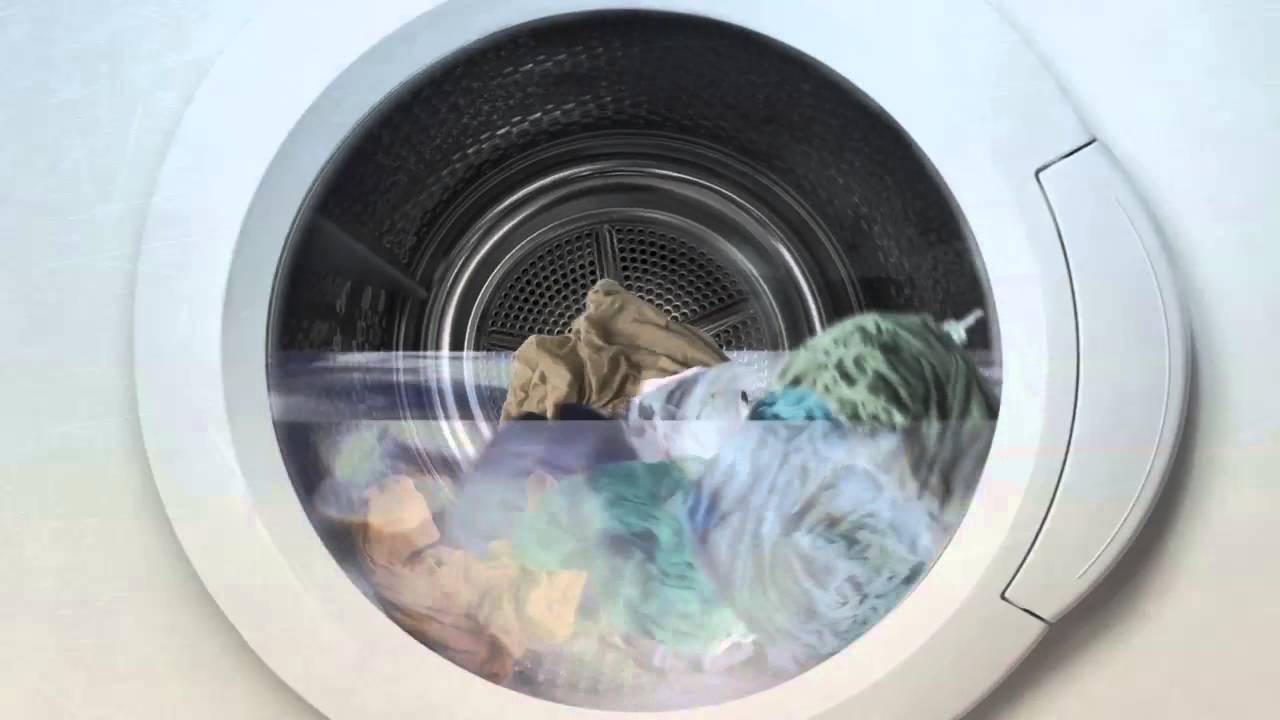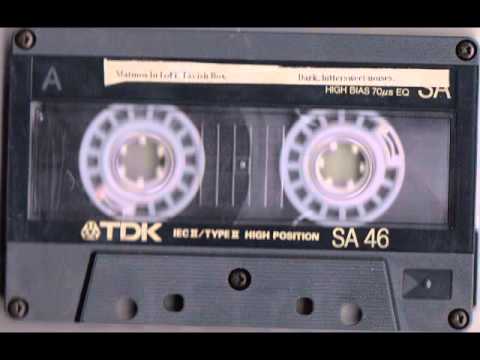Matmos are an American experimental music duo featuring musicians/partners Drew Daniel and M.C. Schmidt. Their output is usually highly concept driven and often features prominent use of non-standard sound sources. Their current album Ultimate Care II, out now on Thrill Jockey, is constructed entirely from sounds generated by the couple’s washing machine.
Martin Schmidt: You’ll have to forgive us if we sound a bit groggy. We were out til 6am. We did our first ever Ultimate Care II show in Baltimore last night. How did we transfer the record to the stage? With a great deal of difficulty and inconvenience. We actually brought the washing machine from our basement to the club venue in a van. We had a 30 gallon garbage can full of water and a pump on stage with us. We use the rhythm of the actual machine. It’s very much like the album but even more literal. We play drums along with the CHUGGA CHUGGA CHUGGA CHUGGA of the washing machine’s spin cycle.
Drew Daniel: It was very nerve wracking because the show is precise. After we set it up on stage, Martin started the fill process and we all set stopwatches running by the side of the stage because we knew we absolutely had to stop dead on when [the spin cycle] ended. So we were trying to get lost inside, and explore, these patterns coming out of the water but there was also the need to be aware of the layout [of the cycle]. We needed to land at exactly the right time. The washing machine was like the band leader. It was James Brown. “Hit me two times! Boom! Boom!” And that’s how we had to do it.
MS: It was a good crowd. I always appreciate it when you can be on stage doing some dumbass thing with a washing machine and then you look up and this room full of people who had all been behaving like party monsters an hour previously were all silent. They were all really listening intently to…
DD: …the fucking washing machine! We needed to find a way of getting an Ultimate II for when we bring the show to Europe. A friend’s boyfriend has found one in Bavaria so we’re trying to see if we can get someone to drive over from Prague to pick it up in Munich and drive it to Berlin so we can play it in the Berghain. That’s the problem with this live by the sword, die by the sword commitment to what we do. You have to then bring it. There is something industrial about the show. Last night, I felt we were closer to the palette that inspired me when I was a kid: stuff like Neubauten’s Strategies Against Architecture.
MS: There is plenty of processing but also a lot of raw washing machine noise. If you’re going to do a longform piece of music, my feeling is you have to be able to trust the source material as it stands originally. There should be plenty of the actual acoustic sound of it. The great master of this is Chris Watson who does nothing [to his source material] and he creates these ingenious brilliant voyages. Someone else who is brilliant is Bernard Parmegiani where all the sounds are always being modulated all the time.
DD: I’ve got a glass jar here [holds up container]. This is an example of something that does not have any associations. It contains dust that flaked off a mummy, that a friend of ours who is [an art] mover collected for us. Now we could mic up a surface and pour mummy dust on it but functionally we’d have to say: “Hey, this is mummy dust.” No one would have any associations with that noise that mummy dust makes and it would force people to associate the sound with a bunch of signifiers. The washing machine is different because it is already sonic and the listener already knows what it sounds like because they have done laundry. So we don’t have to do this act of PR on behalf of the sound it makes. Whereas we would have to with the jar of mummy dust. It would be a strange… Which is not to say that we’re not going to record the mummy dust.
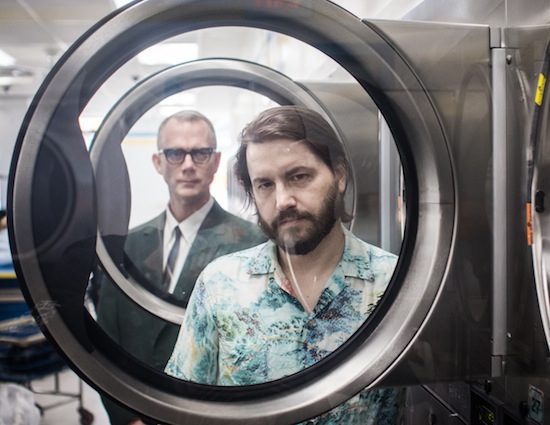
Matmos – In Lo-Fidelity (1994)
Fascinating and occasionally bonkers mid-fi sound collage of musique concrète, sound effects, harsh noise, jungle breaks and gross bodily sounds recorded as Drew and Martin were becoming musically and romantically intertwined and then released on cassette.
DD: This tape to me is the sound of us falling in love with each other. It’s the sound of us getting to know each other. And then it’s us returning to that sound, compressing it, looping it, chopping it up. It’s intimate in the way that couples are and in the way that they create in-jokes.
MS: The idea of anyone attaching seriousness to this recording is a bit much. It is the sound of two people goofing around. Brilliant? I’m not sure it is… It can be obnoxious. When we were recording it I’d go for some harsh ridiculous texture and Drew would want to outdo me. We catalysed ourselves in that moment. And [I was] learning a new technology. Audio editing on a computer was brand new to me then and I’d only ever used the horrible early form of ProTools before this. It is in 8-bit mono. But as for the sense of humour; all of the strange effects and comic music? It gives the game away because the core of what we do is not taking the world very seriously. There’s a sample of Charlton Heston giving an anti abortion speech from a cassette called The Silent Scream. Drew was only 20 years old and we were laughing at it in this very stupid, South Park-style way. On the other hand I will continue to subscribe to the view, If you can’t laugh at the sadness of the world you’re in a very dark place already.
DD: There’s a great Mel Brooks quote, “Tragedy is when I hurt my finger, comedy is when you fall in a sewer and die.” [LAUGHS] And I think that kind of humour with brutality thing is going on here. There are a lot of harsh noise textures but our sensibility is not that of a Whitehouse, darker than thou, chest beating, macho persona. Ours is kind of campy or goofy and that’s the kind of people we are. I worry that records with humour don’t have any kind of staying power; but that’s what I love about People Like Us or Nurse With Wound… there’s a sense of humour but there’s also a darkness that balances it out.
MS: I never really intended for this cassette to come out again.
DD: I was really into drum and bass when we made this. I was into that period of Suburban Bass and Moving Shadow, Sons Of A Loop Da Loop Era. Those early breakbeat techno records were really fast and had a lot of cut ups, especially the LSD EP by Kaotic Chemistry, which was really influential on me. I wanted to do that sort of music but I didn’t have Cubase and I didn’t really understand what a sequencer was for then. I was just chopping audio and I guess that’s what Burial does now, editing breaks in an entirely audio environment rather than a sequencing one.
Matmos – Quasi-Objects (1998)
The duo’s second album, released on their own Vague Terrain label, made critics – who perhaps believed they were the butt of an elaborate joke – nervous when it was released but is clearly the juncture at which Matmos began to find both their feet and some space to call their own.
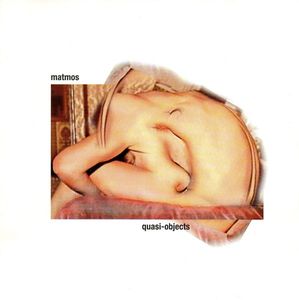
DD: This is the album where we first start to define what we actually are. The first album [Matmos] is all over the place because we’re trying out a lot of different styles. Quasi-Objects is a refinement of things that are implied on the first album but it’s where we consolidate our methodology. Frequently but not always we have a single object sound source per song. That idea shows the fingerprints of Matthew Herbert’s Doctor Rockit records on us. It’s also about pitch. If you record an object and then stack it up in octaves above and below itself, you don’t need to worry about it being out of tune with itself or some other pitched set of instruments. So in a way deciding to make a whole song from a latex T-shirt or a whole song out of walkie-talkies, which stay resonant with themselves. On the latex T-shirt song, Martin would lick his finger and rub it along the top so it made this honking noise and we noticed that it sounded a little bit like ducks. So we took a tape recording of a manipulation of the T-shirt and then went to a nature reserve where there were ducks. We then played the manipulated T-shirt sound in the ambiance of the area where the ducks would be.
MS: I was hoping to get the ducks to talk back to it but they just walked away.
DD: We recorded the playback and it made the noise of the T-shirt seem more duck-like for being in that space. We’re also learning our gear on that record. For example, we encountered a problem – if we’re only working with body sounds, how do we make a satisfying bassline out of that? We recorded some whistling. We took the pure tones of this and dropped it four octaves and suddenly we had this deep, big, rich, resonant bass. There’s a lot of joy in looking at the plasticity of sound going on.
It’s also the record where we play with house for the first time. I never thought I’d make a house-y record but the track ‘Stupid Fambaloo’ on that record, made with samples of a balloon, is very much house music in spirit. We’d both been in gay bars and heard terrible house music but also heard some great house music.
MS: San Francisco at the time was a very house music city. That was the standard thing that got played in every damn coffee shop and bar.
DD: There was a lot of crystal meth going on and a lot of people staying up all night. They’d go to this club called The End Up and stay there until 6pm on Sunday without stopping to sleep. They were just going, going, going… There’s this deep house wormhole you fall into via the repetition. This is something we relate to, maybe coming from a more psychedelic direction. The patterns you can get locked into form part of the mobility of electronic music. And you can get locked in whether you’re high or not. It’s a part of the brain you can access. And relentless looping and transforming of sound is the language we’ve been exploring for decades. Nobody will ever exhaust the potential of doing this.
MS: [Making music for] porn probably paid better than being in Matmos early on. Actually porn music paid pretty well and it was so straightforward to make. The porn people order their music by the yard. Our first order was like this: ‘We need 100 minutes of music by Thursday.’ It’s a weird way to think about music but I guess some people do the same with easy listening music or hold music or what is characterised as elevator music and porn was no different. And that looping thing that Drew was talking about, boy does that lend itself to this kind of music. “What? You need 100 minutes of music? No problem. Let me just fire up the looper…” It has to have a musicality to it but it can’t pull the focus away from what’s happening on screen… the music isn’t why people are there.
Björk – Vespertine (2001)
Björk’s fifth album is considered by many fans and critics alike to be the best of her career. Matmos featured on the release adding textures and patterns to five of the eleven tracks. The pair then joined her on world tour as live programmers and, on some dates, support act.
DD: We were in danger of becoming full-time, paid up musicians at this point. I withdrew from grad school for a year and we were paid very generously by Björk when we were on tour with her doing programming. It was disturbing to us because up until that point we hadn’t felt any of the responsibility that can come with making music. Up until then we’d just been doing music for fun. And suddenly we were concerned about our amateurishness. Martin and I had worked out a private language to express what we were doing but that isn’t how professional musicians communicate. We voiced these concerns to Björk but she said not to worry, that she would work out how to incorporate us and what we do into her sound without it being an issue. She is unique for very many reasons but she is a great collaborator. For example she can work with [arranger, composer] Vince Mendoza, meaning she can collaborate with a string orchestra, then build up in that direction but also if she wants to work with a drummer like Chris Corsano, then she can do that as well. So with us she simply found a way to integrate us into her world.
MS: It was a very interesting experience but I’m not sure if we’re cut out to be musical samurai or ronin. I didn’t know there was a world of these ronin programmers out there – like these musical Bushido assassins who roam from master to master. We met a lot of these people during this period but the life wasn’t really for us.
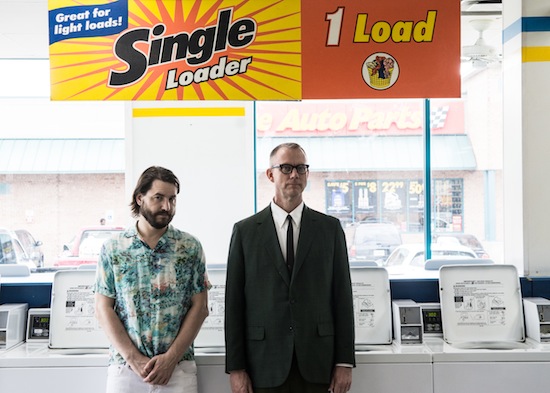
DD: We were programmers on Vespertine not producers. We were making patterns – rhythms mostly – some keyboard parts and we were doing them on top of a skeleton that she had already made. In some cases the song was already quite evolved when we started work on them; ‘Pagan Poetry’ was pretty much done, for example. We were part of a cadre of people who were asked to create parts for the music and Björk would select different elements from these. People would often ask us about when we produced Björk; and we would be like, ‘Well, no… we didn’t.’ I think when people are not inside this kind of endeavour they often don’t realise what a team effort making an ambitious record like this is, but also the team effort aspect should never obscure the authorship of the record which always belongs to Björk.
MS: I don’t think sexism alone is to blame for this idea [that Björk is purely a singer or a dilettante who relies heavily on a team of producers]; there is also the fact that people don’t want to know how the sausage is made. They are not as interested in how music really works and they want to make these simple stories. And this is where the sexism comes in; the idea that she’s sort of like a goddess singer who floats above all she observes and then there are the little dwarves in the mines who do all the hard work is incorrect. In reality she’s actually the floating goddess and the dwarves in the mine, for the most part.
Matmos – The Civil War (2003)
An ambitious work combining experimental electronica, musique concrète and early Anglo/American folk music, this is, for the author at least, one of the most underrated albums of the new millennium and is illuminating about the way that so-called non-musicians work with their professional counterparts.

MS: All of Brian Eno’s talk on the subject of musicianship is foundational to how I make music. My stoned reading of his words when I was young is certainly core to how I now think about music.
DD: We’re very limited in the terms of our abilities but we have some friends who can go off and I think with Eno he could rely on this range of people like [Robert] Fripp and [Phil] Manzanera and it might be that Mark Lightcap of Acetone is our Fripp. He’s an incredibly thoughtful guitar player with a deep knowledge of what tone can do. And he’s listened to a lot of the kind of records that we really admire. So there’s a shorthand where we can describe what we want even though we don’t always have the technical language to describe what that is immediately. The Civil War is a weird one in that there are passages of dobro, acoustic guitar, hurdy gurdy that show us, um, at the edge of our competence [LAUGHS].
MS: Often me. I always liked that term, ‘naive guitar’, which seems to say, “It’s OK if I’m not a master guitar player; with care I can still make some good sound patterns with a guitar that will convey ‘guitarness’.” And then you bring in super competent people to fill in the rest and you sort of end up making this fantasy collage music.
DD: I see this album as being an Anglo-American musical project which was taking half English Civil War era music and half American Civil War era music and then smearing them together. It’s a bit like the latex T-shirt and the ducks. The idea that two things are in dialogue with each other. The thing that really sparked this album off was seeing these weird Masonic robes my uncle in Memphis had. These clothes were from the Deep South but were owned by people who were kind of pretending to be Arthurian knights.
MS: While making this record we were in Montgomery, Alabama, visiting Drew’s grandmother. I saw an ad in a newspaper for a piano store that was trying to set a Guinness World Record for the most pianos ever simultaneously playing ‘The Stars And Stripes Forever’ by JP Sousa. And they were doing it on the fourth of July! On Independence Day… We were like, ‘Man, this is some golden cheese right here. We’ve got to get down there.’ We didn’t have any gear with us, so we bought a crappy Dictaphone to record it. And it was an art event. There were hundreds of pianos and in such a vast space. It’s such a great metaphor for our country. The room was so big that the people at one end of the warehouse couldn’t keep time with the people at the other end of the warehouse.
DD: It was like Charles Ives but unintentionally so. So you had this rippling, cascading effect of all these people trying to stay in time with one another but not quite able to.
Matmos – Work Work Work Installation (2004)
In the March of 2004, the pair set up their home studio in the Yerba Buena Center For The Arts gallery in San Francisco for a fortnight. The event was open to the public and the pair attended every day during office hours while they composed music which was eventually released as a limited edition CD-R.

MS: We were playing music for eight hours a day.
DD: It was improvisation as desperation. I was so desperate just to make some original sound just to keep myself interested. And people would start to come on repeat days just to hang out. They would come and eat pizza and read books. It’s crazy that we’re talking about it today because a friend of ours Jamie, who is staying with us at the moment, we first met him through Work, Work, Work. He came up to us and introduced himself. He was this shy kid in college who was studying maths and was really interested in art. He seemed really sweet and friendly. It’s now 17 years later and he’s staying at our house with his wife because he was helping with the video to Ultimate Care II last night. So there’s a very direct sense in which, when you make yourself accessible and vulnerable, all of this stuff can come into your life if you’re not hiding in the green room. A lot of artists want to be mysterious and they think if they put up a lot of barriers between them and the audience that it will create this sense of allure, and sometimes it does do that but they might also be missing out on quite a lot.
MS: I don’t think we’re really that accepted in the art world. Music generally occupies a really strange place to them…
DD: We are a band, we go on tour, we release records; I’m not sure if we can suddenly claim what we do is fine art. But we’re not at home in the music world either due to our amateurishness. So perhaps we’re always bound to be vagrants?
MS: Each of the 500 CD-Rs we released of Work Work Work had unique collage covers made by Darcy Bartoletti, with each one featuring pictures of the security guards who were in the gallery during our installation because they are the unacknowledged victims of the art world.
DD: Especially when it comes to sound art. They have to experience the noise that sound art makes. This is what I always think about when it comes to sound art. If an artist makes a loop that’s maybe 30 seconds long or two minutes long, have they really reflected on what they’re doing to the museum guard who has to listen to that for eight hours during a working day? Think about the cruelty of that. This was just a small way of acknowledging them.
The Soft Pink Truth – Do You Want New Wave or Do You Want the Soft Pink Truth? (2004)
The Soft Pink Truth is Drew Daniel’s solo project which, often, versions hardcore punk and black metal tracks in a house or electronic R&B style, serves to ask questions about scene politics in various genres.
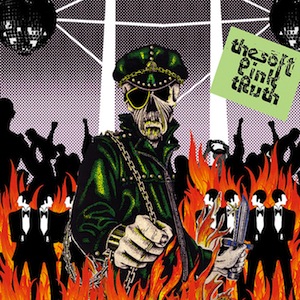
DD: Matthew Herbert told me he’d love it if I made a house music record for his label [Soundslike]. I was nervous about this because there are so many landfills full of mediocre house music and I didn’t want to contribute to that. So I said, “I’ll do it if you contribute to quality control and tell me when the tracks are ready.” He’s always been very good at being straight with musicians. He’ll tell you if he loves what you’re doing; he’ll tell you if he thinks it sucks or doesn’t gel. I did some tracks for him for an EP and then I found out I really loved having this outlet. Because I get attached to and make a lot of music all of the time it doesn’t necessarily mean it has to be Matmos. Matmos has to be a space for both Martin and I. Having the freedom of being able to say, “It was Matthew Herbert’s fault… he made me do it”, was also very liberating.
MS: The Soft Pink Truth was also the solution to a problem between Drew and I; and that was I didn’t want Matmos to be about music for the dancefloor and for it to be subject to all of the strictures that dance music is. And I could see that Drew, who is maybe more prolific than I am, was going to be restlessly cranking shit out on the laptop all the time. It was a very peacemaking thing in the world of Matmos.
DD: It’s a space where I can work out my ambivalence about house music. I grew up into punk and hardcore and house music was what ‘those gay dudes’ liked. When I was younger I wanted to do something that was more hardcore and badass. So there was almost a second coming out involved with it: ‘Yeah, I’m a gay man who makes house music.’ What could be more cliched right? My relationship to this project has changed a lot over the years. It started as a guilty pleasure and I have the Why Pay More out on Bandcamp now. But if something is forbidden then I’m attracted to doing it, and that’s how I got into it.
It’s weird, I think the narcissism of small differences comes out pretty heavily with me when I think about Nouvelle Vague [alt rock covers rendered in a lounge, bossa nova style]. I resent those records yet why should I feel that what I’m doing is any different? I think that nostalgia and fandom take many forms. For me there was always a feeling of mixed emotions that I really loved punk and hardcore but there was also a lot of shitty politics and homophobia attached to the scene, in my experience… especially when it came to the really jock-y, bro-y, straight-edge hardcore scene in America in the mid-80s. There are certainly hardcore bands that are so sacred to me that I would never cover them or I wouldn’t know how to cover them in a way that was valid. For example if I did the Misfits, it would probably just end up some kind of gothic, wannabe, karaoke Danzig thing.
Having Vicki Bennett be the voice of CRASS on ‘Do They Owe Us A Living?’ solved a lot of problems for me. I can’t sing in a fake English accent and it’s painful to hear people try. So I’m really glad I had Vicki’s participation. I think she did a great job.
The only person who reached out to me after hearing it was Nikki Sudden from Swell Maps, he really liked what we did and that was right before he died. I really would have loved to have met him. Oh, actually, L. Voag of The Homosexuals wrote to me as well and wanted to know if I had any money for him. It was a totally fair enough question but the answer was no because I made jack shit off that music.
It’s weird because of the antagonistic edge to the project. With Why Do The Heathen Rage?, I respect the artistry of a lot of black metal musicians but the politics of that scene are toxic and ongoing in their shittiness. There’s a question when you do something like this; are you trying to get your heroes to like you or are you doing something to criticise the scene that they’re from. I don’t think you can have it both ways. I’ve been told via certain channels that some people in the black metal scene are aware of my record but so far no one has stepped to me directly. I was going to originally call the album Fenriz Has A Guidance tattoo. [Guidance Recordings is a Chicago based dance label, Ed.] Fenriz of Darkthrone is a very articulate presence in music but so far, generally, the silence has been resounding…
Matmos – The Rose Has Teeth In The Mouth Of A Beast (2006)
Arguably the highest of all the pair’s high concept albums, The Rose Has Teeth features ten tracks dedicated to ten maverick figures from queer history and uses sound sources and musical styles and techniques applicable to the character. For example, ‘Rag’ the song dedicated to William Burroughs features the noise of a typewriter and a gunshot.
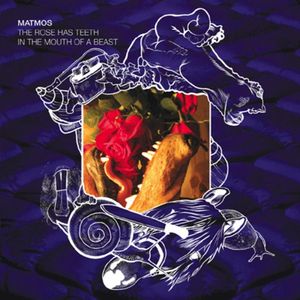
DD: When someone listens to the track ‘Roses And Teeth For Ludwig Wittgenstein’, does it matter if they don’t know that the rhythm was made by us using roses as beaters? Yes and no.
It matters that we’re not lying, that we really are making beats out of roses and it matters because objects matter… because they determine what the sound outcome is. Does it matter in the sense that people who don’t know the sound source are somehow cut off from what the work is? I don’t think so. The rhythms that we got on that song have everything to do with how a bunch of roses sound when they strike a surface and if we had have used twigs or branches it would have been a different sound and therefore a different rhythm. Therefore, yeah, I do think it matters. But does that get us any closer to [the philosophy of] Wittgenstein?
I was very much enamoured with Wittgenstein at this point in my life. I was a philosophy major and I was debating whether to pursue philosophy for the rest of my life or not and I fell under the spell of the Wittgensteinian argument that philosophy is rooted in problems of language and that if we attend to language we can climb up the ladder and then throw it away and get rid of the need for philosophy. We can therapeutically cure ourselves for the need for philosophy. I believed in that so deeply that I abandoned philosophy and did English instead. So I went to English grad school and now I’m an English professor. So there was a time in my life when Wittgenstein really directed my path. But does that mean my song somehow expresses Wittgenstein? I think frankly he would have hated that song. I don’t think he would approve.
But also it should be said that Martin playing the roses is different to how I would have played them. I think Martin’s ability to play these objects is the important thing here. So perhaps instead of trying to create a portrait of Wittgenstein we’re actually creating a portrait of Martin.
As to whether there’s a genre we won’t touch… wow. I guess singer songwriter, acoustic soul-baring music. It would be very hard for us to do that effectively I guess. And genres that are toxic to us, that we just couldn’t do? As soon as I bring up a genre, I then think, “But maybe we could…” But yeah, that really authentic, open-mic, coffee house acoustic music, I just don’t see that we could do that. We actually like a lot of music that people might not associate with us. I listen to a lot of schlager, that sappy German music from the 70s.
MS: We won’t be doing any crabcore any time soon. And I think a Matmos rap rock is unlikely as well.
DD: We should make an album where you rap Martin… holy shit, that would be so dark.
MS: I think with this album we were either more in control of our craft or we got lucky to the extent that we didn’t end up making an album that was a hodgepodge of pastiche. That’s the problem with strictly applying these concepts. Personally, that’s where I think we failed with A Marriage Of True Minds. We were so true to the concept that we ended up making an unlistenable album.
DD: I think you can produce an album where all of the songs are stylistically the same but it’s a failure and I think you can produce an album where all of the songs are very different from each other but it’s still great – think of Throbbing Gristle’s 20 Jazz Funk Greats, that’s my ultimate example of a successful work of art that’s heterogeneous. But it’s very hard to do that. A lot of it comes down to sequencing. Which songs do you put in which order. I think ultimately with The Rose Has Teeth there was an emotional coherence because ultimately a lot of the lives the songs are about have similar arcs and they went to similar emotional places so they do pull together for me even if they go to different places stylistically. Whereas Marriage Of True Minds truly is all over the place because all of the visions and psychic experiences that people had were different from each other. So it was a conceptually tight record but unfortunately a rather exhausting listen.
Robert Wilson – The Life And Death Of Marina Abramović (2011)
A three hour theatre piece that combined opera, drama and performance art – drawing in the talents of Marina Abramović herself, not to mention music by Antony, William Basinski and Matmos
DD: There’s a really key scene in this play about the performance artist Marina Abramović living on her own in a flat with her washing machine…
MS: Oh god, I hadn’t thought of that…
DD: It’s this scene about her getting caught in it and having to get some strong guy from the village to break it open for her. It may well have been the washing machine trauma that we suffered sitting in that dark of the orchestra pit which led to the current album.
MS: Willem Dafoe’s monologue, which we heard about two billion times, goes [puts on preposterous voice which sounds exactly like angry Yoda]: “Her mother has bought a… WASHING MACHINE!” God. His over the top delivery of that monologue has been burned permanently into my brain and you’re right, that may be core to why we did that. Hearing Willem go: “WASHING MACHINE!” Night after night after night… that’s what did it.
DD: That was a weird experience. We owe it all to Antony [Hegarty]. She wanted us involved in the project because the music had evolved from being based on William Basinski’s drones and then on Antony’s songs. Her songs were so melancholic that maybe she thought if we were involved perhaps there would be a different, uptempo spirit of playfulness which would balance out the show. It was very much like the Björk situation, Anthony wrote the songs and we just wrote textures and patterns to go over the top. We were really just along for the ride, so if you’re reading this Antony, thanks!
Marina – before the celebrity and the media-tisation of the art world that we live in now – was originally like the Joan Of Arc of performance art. She absolutely was completely committed to her art in terms of endurance, risk, pain and really exemplified an untouchable integrity of following through on an impulse, whether it was, ‘I’m going to walk the length of The Great Wall Of China’ or, ‘I’m going to wait until this snake is very hungry and I’m going to sit in its cage with it.’
Robert Ashley – Perfect Lives (2014)
A recent performance of American composer Robert Ashley’s surreal 72bpm spoken word "television opera" (1978 – 1983) at Issue Room Project.
MS: I suppose in a weird way it’s a non-sequitur to most of our work. I fell in love with record called ‘The Bar’ (which is a section from Perfect Lives) when I was about 22 years old. I had no idea what it was, who this guy was, whether it was even music or not. It sort of sounded like spoken word and called itself part of an opera but it didn’t have anyone singing on it. The music is entirely played on home organ and piano and there is this sort of rhythmic monologue that goes over two full sides of a record. My weed smoking friends and I would laugh and memorise parts of it and use it as part of our daily speech. I sought out other parts of it and found another record called The Park and then another called The Backyard.
DD: Robert Ashley’s music is strange melding of poetry and the cadences of minimalist music yet it’s also funny; it takes the American landscapes and stretches them out. Perfect Lives seems to be an opera about a group of characters who commit a crime in a small town. There’s an implied narrative but a lot of the libretto also meanders in a way that seems very abstract. There’s a real beauty to it. So with the performance for Issue Project Room we added our own arrangement of The Backyard to a string arrangement that a friend from Baltimore had written. At one of our performances in New York Robert Ashley actually came.
MS: It was terrifying.
DD: Yeah, he was sitting on the front row, conducting on his knee, tapping out the pattern you’re supposed to use when you deliver the language. So it was quite unnerving to us.
MS: He was just a really singular thinker and his music is not like anyone else’s. As soon as you hear it you just tap into this way of speaking and this way of thinking that is quite powerful, funny and beautiful.
DD: I would really recommend that people listen to a choral piece by him called She Was A Visitor where the performers stretch out the vocal sounds to the phrase, “She was a visitor.” Just listen to it. It’s amazing. It’s from an album called Automatic Writing which was hugely influential on Nurse With Wound. Stephen Stapleton said that when he took LSD he would only listen to Automatic Writing, which is concerned with this tourette’s like set of vocal tics that Robert Ashley had. It’s a beautiful and strange record.
MS: On that album he was working with sounds that were that quiet that you can actually hear one of his neighbours playing an Al Green record, through the wall of the house. Actually we’re going to be performing the Robert Ashley pieces The Park, The Bar and The Backyard in London in October of this year.
M.C. Schmidt – Batu Malablab (2015)
Martin’s first solo album and arguably the most difficult piece of music to come from either of the duo to date. It is, roughly speaking, a fantasy gamelan album played on a prepared piano accompanied with electronics, fake birdsong and many other sound sources.
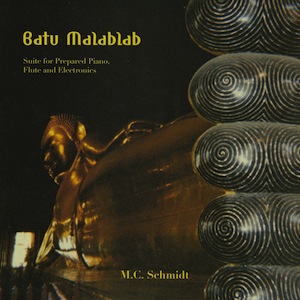
MS: I guess the title is slightly self-defensive. The phrase “batu malablab” comes from a book that we have called Balinese Music by Michael Tenzer. He describes the phrase as an insult that people in Gamelan ensembles lay on other Gamelan ensembles who aren’t very good or are ill-prepared. Literally it means to boil a rock, which is to say you could try and make soup out of stones and of course you’d never get any flavour from them.
DD: And I guess it’s onomatopoeic as well, with the “malablab” word sounding like the boiling of the rocks. It sounds like the concept for a Matmos record. We should try it and see what happens.
MS: I don’t know if I should say this but originally I was going to call the record An Exotic Fantasy Of Asia but Drew thought that it was really offensive and that I should not do that, so I bowed to his better wisdom. But I love “Hawaiian” records that are entirely made by Jewish guys in New York and I love the whole “exotic” world made, largely, by white people imagining what it must be like in the exotic, glamorous East, based on a few chord progressions and note relations that are “Eastern”. I love the whole idea. Good examples of this are by Martin Denny or, one of my favourite examples, is this band called The Outriggers.
DD: It’s weird because my edit of the title was because I was afraid that people would see him as somehow being uncritically racist. But when you indulge in exotica’s fantasies of mystique, that has been such a rich seam of culture for people to mine but the real racism comes in not seeing it for the fantasy that it is. And Martin’s title did include the word “fantasy” to put that out there to make it very clear that this is what it is. No one’s making out that this is a sincere reflection of traditional musics. It’s a tricky one for sure. It’s like how people both love and are threatened by what the Sun City Girls do, which is to consider and draw from but also to distort various ethnic musics from around the world. It’s a tricky game to play.
MS: I don’t think it’s any different from 1960s guys in Laos with quiffs playing rock & roll in leather jackets. I don’t think rock & roll was threatened by those Cambodian guys who were having fun with their exotic fantasy of New York. Music is not subtracted from by homage. No one loses anything. I mean, I find the Rolling Stones pretending to be old, black sharecroppers and their entire schtick of stealing African American music, vaguely offensive but also funny.
But basically I bought a piano and it was warped. I couldn’t tune it. My only option was to prepare it. And the fact that the prepared piano sounds vaguely like a gamelan orchestra and I like playing patterns that are sort of “gamelan-esque”, even though I can’t really keep it up. I try to stay honest with that by not editing heavily but instead layering parts. This is my Les Baxter tribute.
DD: All the stuff that sounds like female choirs. That’s Martin manipulating his own voice.
MS: So there’s a certain amount of audio drag going on. None of the birdsong is real. It’s all me imitating bird call. [Olivier] Messiaen is the great transcriber when it comes to birdsong. But it’s interesting when you think of bowerbirds and lyrebirds as samplers. They literally hear and imitate the sounds of all different kinds of actions around them. Aristotle thought what made humans special was their enjoyment of mimesis but bird song is often imitative. Bowerbirds and lyrebirds will often imitate the songs of other birds and other noises around them. So Aristotle was wrong, birds can derive pleasure from imitating sounds around them too.
Ultimate Care II is out now on Thrill Jockey


